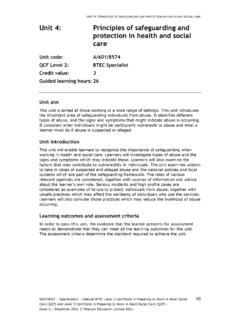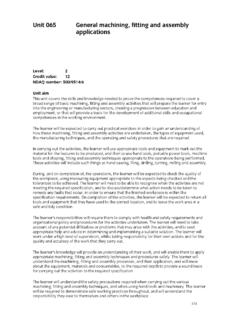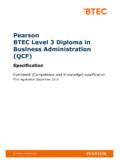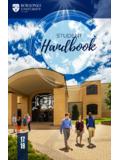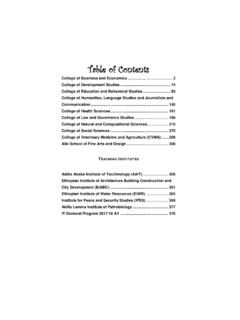Transcription of Unit 33: Support Children and Young People During ...
1 Unit 33: Support Children and Young People During Transition in Their Lives Unit code: D/601/8325. QCF Level 3 Specialist Credit value: 4. Guided learning hours: 18. Unit aim This unit covers the knowledge, understanding and skills to Support Children and Young People through transitions in their lives. It requires competence in recognising and responding to signs and indications of transitions and supporting them to manage transitions and reach positive outcomes. Integrated working to Support Children and Young People through transitions is an important aspect of this unit. Unit introduction Transitions are a natural part of growing and maturing and common transitions, such as starting school or moving to secondary school, can be anticipated.
2 Some Children or Young People experience transitions through life events such as bereavement or family breakdown. Transitions can have a significant impact on emotional and social wellbeing and learning and therefore Children and Young People need Support to cope with all transitions. Children and Young People with disabilities or special educational needs and those most at risk of exclusion or underachievement are particularly vulnerable to the effects of transition and it may be necessary to adapt or intensify Support to improve outcomes for these individuals. Early identification of changes in the attitude and behaviour of Children and Young People which may relate to a transitional experience is essential to ensure Support is planned and provided through multi-agency working.
3 Those supporting teaching and learning in schools who work closely with Children and Young People are in a unique position to recognise the impact of transitions they may be going through, provide reassurance and Support , and take appropriate action to enable positive outcomes. In this unit, learners explore the range and impact of transitions that Children and Young People may experience. The particular needs of Children and Young People most at risk of exclusion or underachievement and those with disabilities or special educational needs are explored. BA029026 Specification Edexcel Level 3 Award/Certificate/Diploma specialist qualifications in 325. Supporting Teaching and Learning in Schools (QCF) Issue 2 June 2011 Edexcel Limited 2011.
4 Learners demonstrate their ability to recognise and respond to transitions in Children and Young People 's lives. Learners show they can work with others to plan integrated Support for Children and Young People experiencing transitions, complying with legal, organisational and ethical requirements for information sharing. Learners demonstrate competence in supporting Children and Young People to manage transitions. 326 BA029026 Specification Edexcel Level 3 Award/Certificate/Diploma specialist qualifications in Supporting Teaching and Learning in Schools (QCF) Issue 2 June 2011 Edexcel Limited 2011. Learning outcomes and assessment criteria In order to pass this unit, the evidence that the learner presents for assessment needs to demonstrate that they can meet all the learning outcomes for the unit.
5 The assessment criteria determine the standard required to achieve the unit. On completion of this unit a learner should: Learning outcomes Assessment criteria 1 Understand the range Explain the different types of transitions that and impact of transitions Children and Young People may experience that Children and Young Explain patterns of transition from childhood to People may experience adulthood Explain how different types of transitions may affect a child or Young person Explain how a child or Young person's approach to transitions may be affected by their: culture, religion, personal beliefs, gender, stage of development and previous experiences Explain how transitions may affect Children and Young People most at risk of exclusion or underachievement Explain why Children and Young People with disabilities or special educational needs may need additional Support to manage transitions 2 Be able to recognise and Explain with examples the signs and indications respond to transitions in that a child or Young person is experiencing a Children and Young transition in their life People 's lives Provide opportunities for Children and Young People to explore and discuss significant events and experiences that may impact on them Identify signs of concern or distress in Children or Young People which may relate to a transitional
6 Experience Recognise and take account of any signs of change in the attitude and behaviour of individual Children or Young People Share information and concerns about Children or Young People with the appropriate person or agency according to the procedures of the setting BA029026 Specification Edexcel Level 3 Award/Certificate/Diploma specialist qualifications in 327. Supporting Teaching and Learning in Schools (QCF) Issue 2 June 2011 Edexcel Limited 2011. Learning outcomes Assessment criteria 3 Be able to work with Explain the Support available for Children and others to plan integrated Young People going through transitions Support for Children and Explain the legal frameworks, organisational Young People going procedures, and referral routes to ensure through transitions integrated working for Children and Young People going through transition Use knowledge of individual Children and Young People to contribute to planning how to Support them in managing transition Comply with legal.
7 Organisational and ethical requirements relating to the exchange of information Demonstrate respect for the role and expertise of other professionals in planning Support for Children and Young People going through transitions 4 Be able to Support Work within the boundaries and protocols that Children and Young govern own role in supporting Children or People to manage Young People through transitions transitions in their lives Demonstrate ways of supporting Children and Young People to manage transitions in their lives Provide Support in a timely way to help Children and Young People to manage transitions and reach positive outcomes Support Children and Young People to recognise and build on their strengths to manage change positively Provide opportunities for Children and Young People to discuss the effects and results of transition Explain when and how to refer Children and Young People to others within the setting or in other agencies should further Support be necessary 328 BA029026 Specification Edexcel Level 3 Award/Certificate/Diploma specialist qualifications in Supporting Teaching and Learning in Schools (QCF) Issue 2 June 2011 Edexcel Limited 2011.
8 Unit content 1 Understand the range and impact of transitions that Children and Young People may experience Types of transitions: types eg emotional, physical, eg moving to a new educational establishment, a new home/locality, intellectual eg moving from pre-school to primary, or primary to secondary school, physiological eg puberty, long-term medical conditions Transition from childhood to adulthood: patterns eg baby eg weaning into solid food, from nappies to becoming toilet trained, Young child eg starting nursery, starting school, Children eg moving to secondary school, moving to further education/training, Young People eg moving to higher education, employment, marriage , parenthood Affects of different types of transitions: types eg emotional transitions may affect behaviour, learning, mental health, intellectual, physical Transitions affected by culture, religion, personal beliefs, gender, stage of development, previous experiences: culture eg ways Children and Young People are supported, encouraged, prepared for planned transitions, attitudes to education; religion eg approaches to bereavement.
9 Personal beliefs, gender eg boys should not show emotions; stage of development eg level of understanding about reason for transition, level of independence; previous experience eg positive previous experience will make Children and Young People confident, poorly managed transition will make Children anxious Transitions affect those most at risk of exclusion or underachievement: reasons eg limited resilience, decline in academic achievement, poor motivation, effects of stress, Children and Young People with multiple adversities most at risk of poor outcomes Need for additional Support to manage transition: reasons eg feelings of insecurity, need explanations relevant to stage of development, vulnerable to bullying, may have been over protected, need reassurance that extra Support is available 2 Be able to recognise and respond to transitions in Children and Young People 's lives Indications of transition: signs eg information from parents/carers, changes in behaviour, decreased motivation, lack of progress, social interactions affected, attendance Discuss significant events and experiences that may impact.
10 Opportunities eg relationship with key person, tutor, mentor, circle time, assemblies, Personal, Social and Health Education (PSHE) curriculum activities, Social and Emotional Aspects of Learning (SEAL) activities, activities to prepare Children moving from Early Years Foundation Stage (EYFS) to Key Stage I, activities to prepare Children moving from primary to secondary school BA029026 Specification Edexcel Level 3 Award/Certificate/Diploma specialist qualifications in 329. Supporting Teaching and Learning in Schools (QCF) Issue 2 June 2011 Edexcel Limited 2011. Signs of concern or distress: signs eg changes in behaviour, decreased motivation, lack of progress, social interactions affected, attendance, bullying, being bullied Changes in attitude and behaviour: actions eg follow behaviour policy of school, realistic expectations, apply rules and sanctions, monitor behaviour, report changes in behaviour pattern, speak to child/remove child from situation if distress observed, discuss behaviour with child or Young person Share information and concerns.

